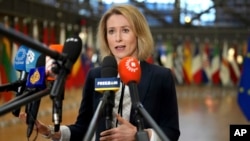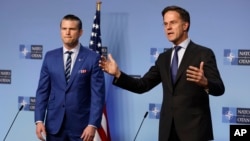The European Union’s top diplomat said Thursday any peace deal struck between the United States and Russia without Ukraine or the EU will fail, responding to U.S. President Donald Trump’s indication he soon would be holding talks with Russian President Vladimir Putin.
EU High Representative for Foreign Affairs and Security Policy Kaja Kallas spoke with reporters Thursday on the sidelines of the NATO Defense Ministers meeting in Brussels.
She referenced Trump’s comments Wednesday regarding a phone call the U.S. president had with both Putin and Ukrainian President Volodymyr Zelenskyy, saying they both want peace, and Trump wants the killing to end.
“Trump says that the killing should stop. Putin can stop the killing by stopping bombing Ukraine. This is doable if there is a will,” she said. Kallas went on to say any agreement without Ukraine at the table amounts to appeasement.
“It is clear that any deal behind our backs will not work. Any agreement will need also Ukraine and Europe being part of it, and this is clear that appeasement also always, always fails,” she said. Kallas said the EU and Ukraine would be needed to implement any deal that was made.
“Any quick fix is a dirty deal,” she said, which would not work and would not stop the killing.
Kallas’ comments reflected those of many NATO allies at Thursday’s meeting following Trump’s call with Putin and his signaling that talks on Ukraine between the two were imminent.
The meeting is taking place amid a U.S. push for NATO allies to commit more of their domestic budgets to defense. Multiple NATO allies expressed support for boosting defense spending, while highlighting the need for Ukraine and other European nations to be a part of any negotiated end to Russia’s war against Ukraine.
“There can be no negotiation about Ukraine without Ukraine. And Ukraine’s voice must be at the heart of any talks,” British Defense Secretary John Healey told reporters just ahead of the ministerial.
German Defense Minister Boris Pistorius said Ukraine’s potential membership in NATO and whether it should concede any territory should not be decided before peace talks start.
Pistorius told reporters he regretted what he called “concessions” made by the United States ahead of any potential negotiations, referencing comments Wednesday by U.S. Defense Secretary Pete Hegseth, who said Ukraine keeping its pre-invasion boundaries is an “unrealistic objective.”
Hegseth advocated for a negotiated end to the war with security guarantees backed by European and non-European troops that are deployed under a non-NATO mission. He ruled out deploying U.S. troops to Ukraine.
Luxembourg’s Defense Minister Yuriko Backes told reporters Thursday that all allies need to continue to support Ukraine.
"There are talks about peace plans. Nothing about Ukraine should be decided without Ukraine at the table. Nothing about European security should be decided without Europeans at the table,” Backes said.
Hegseth said Thursday that Russia’s invasion of Ukraine “is an urgent, real threat to the continent” and should be a “wake-up call when it comes to defense spending.”
He said targets of allies spending 2% of their gross domestic product on defense is not enough, and that pushing higher — even as much as 5% — is “critical.”
NATO Secretary-General Mark Rutte reiterated his support for higher defense spending.
“It’s only fair, it’s only sensible,” he told reporters Thursday.
Rutte said NATO allies are also not producing enough in terms of military production, saying alliance members need to get more output from their huge industrial base in order to keep up with China, Russia and others.
Following Thursday’s NATO ministerial, Hegseth heads to Poland for what the Pentagon said will be talks with leaders about “bilateral defense cooperation, continued deterrence efforts along NATO's eastern flank, and Poland's leadership as a model ally in defense investment and burden-sharing in NATO.”
Some information for this report came from The Associated Press, Agence France-Presse and Reuters.









